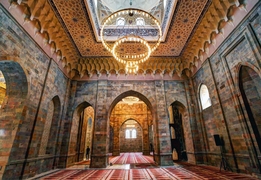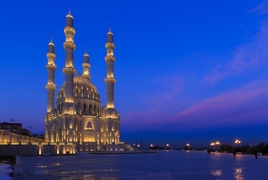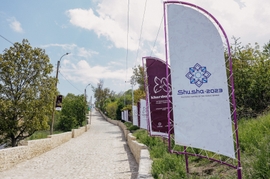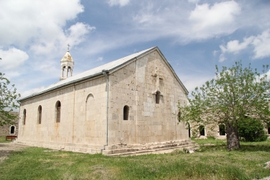President Ilham Aliyev has recently visited Azerbaijan’s Shusha city to inaugurate series of restored iconic cultural buildings and historical monuments destroyed by Armenians during decades of occupation.
As part of his visit to the liberated territories last week, Azerbaijan’s president inaugurated the museum mausoleum complex and a large bust of the prominent Azerbaijani poet and political figure, Molla Panah Vagif.
“Dear friends, it is a very significant day in our country’s life today,” President Aliyev said at the opening ceremony.
“We are celebrating the opening of the Vagif Poetry Days in front of the mausoleum of the great Azerbaijani poet, statesman and vizier to the Karabakh’s khan Molla Panah Vagif. I cordially congratulate you and the people of Azerbaijan on this occasion,” he added.
Vagif’s mausoleum was almost built from scratch after being destroyed and looted by Armenians during the nearly 30-year long occupation of Shusha. The restoration of the mausoleum was implemented by the Heydar Aliyev Foundation.
The original building of the mausoleum designed by Azerbaijani architects Abdulvahab Salamzade and Eldar Kanukov was constructed in 1982, at the place where Vagif was executed in 1797. The construction of Vagif's mausoleum was initiated and ordered by Azerbaijan’s former president Heydar Aliyev, then the leader of the Soviet Azerbaijan.
Meanwhile, President Aliyev has also attended a ceremony to unveil a new monument to the legendary composer Uzeyir Hajibeyli born and raised in Shusha. Earlier this year, Hajibeyli’s bust vandalized by Armenians was returned to Shusha and placed in its original place.
The iconic Azerbaijani composer, Hajibeyli is widely known for forming the basis for modern Azerbaijani music and creating a synthesis of what has become a source of national pride and ethnic identity after he mixed classical music with mugham in early 20th century.
As part of his visit to Shusha, the Azerbaijani president also inaugurated the renovated house-museum of People’s Artist of Azerbaijan, Bulbul. He was first to synthesize the best techniques of the Azerbaijani national singing with the Russian and European schools, creating an all-new vocal school in Azerbaijan.
The house, where Bulbul was born in 1897, spent his childhood years and got acquainted with the music, operated as a museum until Shusha’s occupation in 1992. Armenians ransacked nearly 9,000 documents and 10,000 exhibits from the house and presented them to the world community as examples of Armenian material culture.
Shusha is a key city in the Karabakh (Garabagh) region due to its geographical location and historical significance as one of Azerbaijan’s major cultural, economic, and administrative centers.
The city was founded during the reign of the Azerbaijani Karabakh khanate’s Panahali khan in the 18th century. According to the historical sources, Panahali khan decided to build an “eternal and invincible fortress in a firm and impassable place in the mountains” given the unfavorable location of the previous castles. Construction of Shusha kicked off in 1752 at about 1,600 meters above sea level, and the capital of the khanate was moved to the city in 1756-1757.
Shusha is well known as “the temple of Azerbaijani culture and music” and the conservatory of the South Caucasus. It is home to one of the leading schools of mugham, the traditional Azerbaijani genre of vocal and instrumental arts that has influenced music throughout the Caspian and Middle East regions.
During the First Karabakh War in the early 1990s, Armenia occupied the city. Armenian invaders pursued a policy of destroying Azerbaijan’s historical and cultural heritage in Shusha and other towns and territories that remained under the occupation for nearly three decades.
The Azerbaijani army restored Azerbaijan’s sovereignty over Shusha on November 8 during the 44-day-long counter-offensive operations from September 27 through November 9, 2020. The city’s liberation played a crucial role in the retreat of Armenia’s forces and end of hostilities in a ceasefire on November 10.
Shusha was declared as the cultural capital of Azerbaijan in May 2021 to restore the city’s historical appearance, bring its former glory and reunite it with the traditionally rich cultural life.


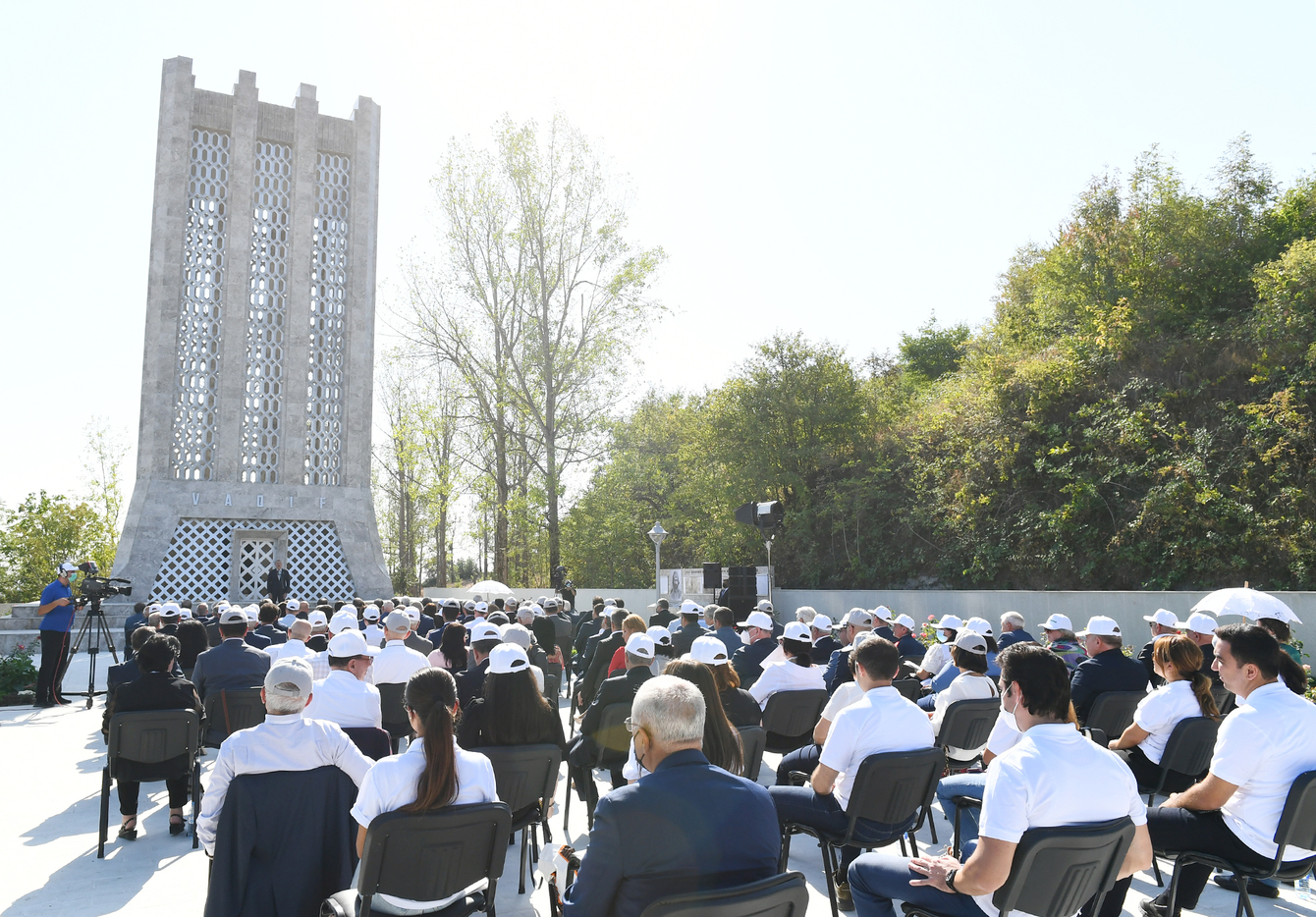




 On the night of April 7 to 8, 1992, a peaceful Azerbaijani village, Aghdaban, located in the Kalbajar district, became the scene of a harrowing tra...
On the night of April 7 to 8, 1992, a peaceful Azerbaijani village, Aghdaban, located in the Kalbajar district, became the scene of a harrowing tra...
 On International Day for Mine Awareness and Assistance in Mine Action on April 4, the Azerbaijani government emphasized the persistent menace of la...
On International Day for Mine Awareness and Assistance in Mine Action on April 4, the Azerbaijani government emphasized the persistent menace of la...
 The number of evacuees from flooded areas in Kazakhstan has reached 97,852 people, including about 32,856 children since March 27.
The number of evacuees from flooded areas in Kazakhstan has reached 97,852 people, including about 32,856 children since March 27.
 Iran's senior military leaders described the drone and missile attack on Israel on April 14 night as “successful".
Iran's senior military leaders described the drone and missile attack on Israel on April 14 night as “successful".
